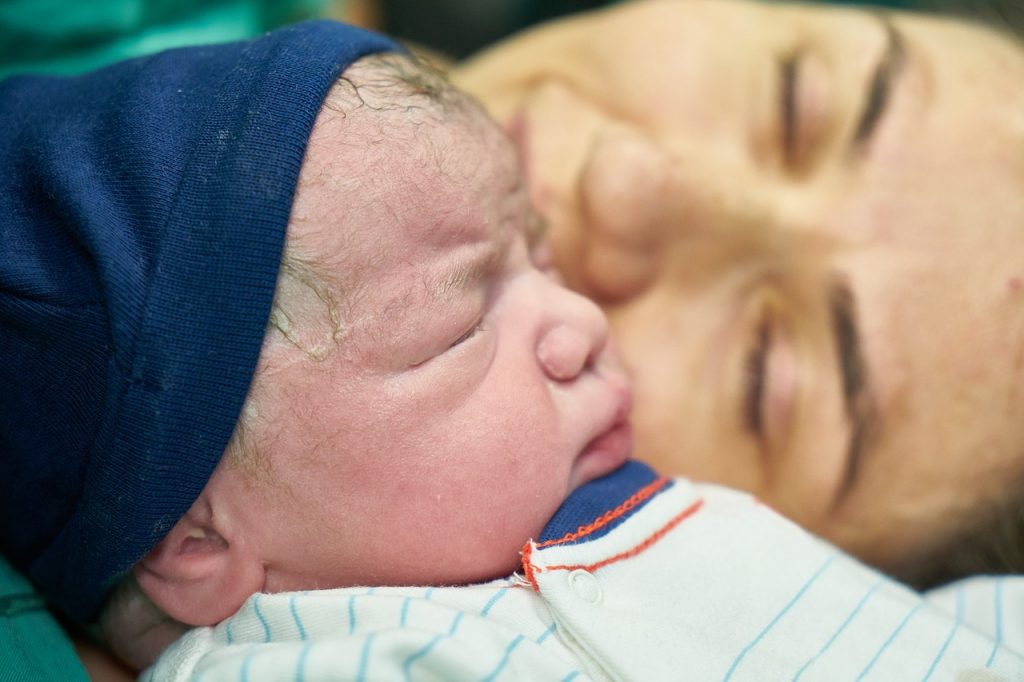UAB has an exciting new initiative bringing hope to many women: uterus transplants. Yes, you read that correctly. And yes, we have some of the most brilliant minds in women’s care and OB/GYN services in the nation just down the road from us.
Believe it or not, UAB is only the fourth location in the nation to offer uterus transplants. Birmingham Mom Collective was extremely fortunate to talk with Paige Porrett, M.D., Ph.D. of the UAB Comprehensive Transplant Institute.

Dr. Porrett was instrumental in the birth of the nation’s third uterus transplant program at the University of Pennsylvania before coming to UAB to start one here. Originally from Michigan, Dr. Porrett moved to Illinois to attend Northwestern University for college and medical school. Upon graduation from medical school, she moved to Philadelphia to the University of Pennsylvania to complete her residency in general surgery, a fellowship in transplantation surgery, and to obtain her Ph.D. in immunology.
Dr. Porrett was asked by colleagues at Penn to start a uterus transplant program after the director of Penn’s Transplant Institute–Dr. Abraham Shaked–heard about the successful birth of a baby in the Swedish trial of uterus transplantation. Dr. Shaked asked Dr. Porrett if she’d be interested in the possibility of offering this to their patients.
He hand-picked Dr. Porrett because she has always been interested in immunology of pregnancy and has the surgical skills necessary to perform such an intricate surgery. But Dr. Porrett’s first reaction was that he was nuts! She thought this kind of surgery sounded much too fringe. After all, transplant surgeries are big operations and can have serious complications, but they are necessary as a life-saving tool. Dr. Porrett could only see all the extreme risks at this point.
Slowly Changing Her Mind
Over the next year, she kept being asked to consider performing uterus transplants. She began to recognize the research value and what could be learned from the scientific side. But what softened her the most to this new idea was becoming a mother herself. After the birth of her own daughter, she gained a new understanding of the deep desire many women experience to become a mom.
Around this time, a new faculty member joined the staff at the University of Pennsylvania who had also heard of the Swedish trial successes and pushed for Dr. Porrett to begin the uterus transplant program, too. After all this, the uterus transplant program finally began at Penn.
A Bona Fide Miracle
One of the first uterus transplant patients at Penn was Jennifer Gobrecht. You can read her incredible story here. Dr. Porrett’s team performed her uterus transplant in November 2018, and Jennifer gave birth to her son Benjamin in the fall of 2019.
Dr. Porrett has helped many people and saved countless lives over the years, but this was a bona fide miracle. She was forever transformed.
Mountains to Move and No Time to Waste
At the time that Penn started their clinical trial, uterus transplantation was quite new and only a handful of transplants had been performed at few places in the world. However, after the miracle of Benjamin Gobrecht’s birth in 2019, Dr. Porrett felt a sense of urgency to move the field forward and make uterus transplantation more accessible to patients in need. In short, she wanted to scale up, right away.
This was no easy task as insurance companies do not yet cover the transplant, and few institutions could commit the necessary resources to develop a uterus transplant program. There were major mountains to move and no time to waste.
Birmingham Calling
A friend of Dr. Porrett knew of Dr. Porrett’s vision and suggested she talk to Dr. Jayme Locke, the director of the UAB Comprehensive Transplant Institute, for advice. Dr. Locke is an international leader in organ transplantation and a transplant surgeon who is passionate about making transplantation more accessible to patients in need. Dr. Porrett describes her as a star and a powerhouse in the field.

The two hit it off right away. Both Dr. Porrett and Dr. Locke are about the same age with the same passion to create a uterus transplant program for those who need it. Dr. Locke invited Dr. Porrett to come meet with the UAB transplant group, members of the Department of Obstetrics & Gynecology, and UAB leadership. She knew Dr. Porrett was exactly who UAB needed to begin this initiative here.
Dr. Porrett was won over by the breadth of UAB’s transplant expertise, their innovative spirit, and their outstanding OB/GYN department. Most impressive was the willingness of UAB to establish uterus transplantation as a formal clinical program, and not offer this transplant on a small scale as often occurs during research trials. UAB shared Dr. Porrett’s vision of making uterus transplantation sustainable; both parties had interest in scaling up and making it available to more patients. Dr. Porrett and her family packed up during the pandemic and moved to Birmingham shortly thereafter.
While uterus transplantation is still a young field with many unknowns, it’s far enough along that doctors such as Dr. Porrett have a good understanding of the risks and the efficacy of this treatment for infertility. Equally important is the reproducibility of the results of transplant. In other words, babies have been born from these transplants at multiple sites in the U.S. and around the world. That said, UAB is the first program in the world to start its program outside of a clinical trial, yet the UAB program maintains its focus on patient safety and is rigorous in its selection of patients.
Who Are Considered Candidates?
Candidates interested in a uterus transplant at UAB must meet (and agree to) certain criteria including being willing to temporarily relocate to the Birmingham area (if not already living nearby) for the duration of the transplant, pregnancy, delivery, and subsequent removal of the uterus.
Candidates must be women between the ages of 18 to 40 with absolute uterine factor infertility (AUFI), meaning they were either born without a uterus or have had a hysterectomy. Many women interested in a uterus transplant have had the uterus removed because of fibroids or even early-stage cancers. A woman who’s had advanced or late stage cancer is generally not a candidate.
You might wonder: where does the uterus for transplantation come from? As Dr. Porrett describes, babies have been born from a uterus donated by either a living or a deceased donor. However, the uterus transplant program as UAB is only offering transplants from deceased donors. This decision was made by Dr. Porrett and her OB/GYN partners as many living donors have experienced serious complications from donation.
A Temporary Transplant
A uterus transplant is a temporary transplant–women do not keep it the rest of their lives. Like other organ transplant recipients, women who receive a uterus transplant are given immunosuppressant drugs. This makes the pregnancy particularly complex and high risk, so uterus transplantation is not an easy road for any patient.
Importantly, uterus transplantation requires a big team full of experts in both women’s health and transplantation. This type of collaboration is best showcased by all the steps involved. Thankfully UAB’s OB/GYN department along with the leadership of Dr. Trey Leath, III (medical director of UAB’s Uterus Transplant Program) is committed to participation and collaboration with excellence.
Prior to transplantation, candidates go through IVF in order to create embryos, as pregnancy after uterus transplantation can only occur after an embryo has been placed directly into the uterus.
This complex pregnancy requires medical supervision by experts in high risk obstetrics–including maternal-fetal medicine specialists–who will help care for mom and baby before and during birth.
All uterus transplant babies are born via Cesarean section with the goal to deliver the baby at term (e.g. a gestational goal of 37 weeks). The average age at birth for babies born to uterus transplant recipients is about 35 weeks. Babies have been born earlier who have needed some time in intensive care. All babies born to date have been healthy and are meeting all developmental milestones.

Women are given the option to have one additional pregnancy, but as soon as the second baby is delivered (or as soon as the first pregnancy is delivered if the parents only want one child), the uterus is removed at the time of the C-section.
All About the Options
Dr. Porrett is quick to point out there is no “right way” to build a family. Uterus transplants are not in any way meant to replace adoption or gestational carriers; this is simply another option that the OB/GYN department at UAB gives women to build their families. Dr. Porrett emphasizes what her partners in OB/GYN have taught her . . . that women’s health is all about options.

Dr. Porrett wants to let women know they are not alone. There are many options to help overcome the challenge of uterine factor infertility. Any of the doctors in UAB’s OB/GYN department can help with more information.
All Brains on Deck
One of the biggest hurdles that Dr. Porrett and the UAB team currently face is to make uterus transplantation accessible and sustainable. This goal will be achieved when uterus transplantation is covered by health insurance companies. Dr. Porrett thinks that allies are needed in payer organizations.
As many know, infertility deserves treatment coverage, too. It is a serious disease that is associated with significant psychologic impact and even disability. Dr. Porrett says we need “all brains on deck” to convince payers to cover uterus transplants. She reminds everyone that health insurance companies often pay for surgeries that correct other congenital abnormalities or pay for organ replacement therapies. Dr. Porrett contends that this organ should be no different.
Need More Information?
Are you interested or know someone who might be? Maybe you want a uterus transplant or want to support the women who do. Or maybe you are an innovator and want to be the first employer to offer uterus transplantation in your employee benefits package. Whatever your interest in uterus transplantation, Dr. Porrett hopes you will share your time, your talent, and your treasure with the UAB team. No idea is too big for this group.
You can find more information at https://www.uabmedicine.org/patient-care/treatments/uterus-transplant. You can also email Dr. Porrett directly at [email protected]. Tell her we sent you! Birmingham is very fortunate to have her here along with the incredible team in UAB’s OB/GYN department to guide you every step of the way.











